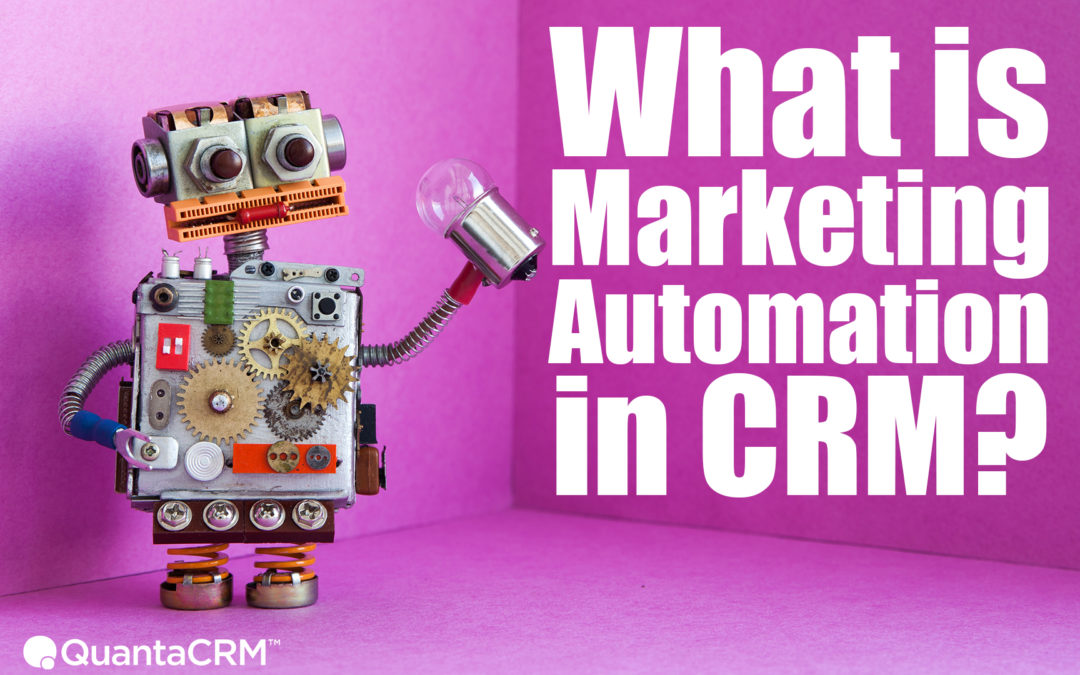Marketing automation tools have improved drastically over the past decade. These days, automation enables small businesses to do a whole lot more with a whole lot less.
We already covered some of the benefits of CRM automation generally and marketing automation specifically, but in this post, we’re going to stick with the basics: what is marketing automation, and what is the role of CRM in marketing automation?
What is marketing automation?
At its most basic, the term “marketing automation” simply refers to software designed to automate certain marketing tasks and workflows. The most common of these marketing tasks include email campaigns and social media posts.
More generally, marketing automation tools are designed to boost lead generation and nurturing, customer life cycle marketing, cross-sell and up-sell opportunities, and customer retention.
The general theory behind marketing automation is this: the journey from lead to prospect to customer requires significant nurturing, with numerous touchpoints along the way. But the buyer’s journey has changed: the Internet amplifies your voice like never before, but your potential customers also have more information and more options than ever before.
It takes more effort to cut through the noise, and the resources required to do so manually would be staggering.
Marketing automation allows you to do more with less. By automating repetitive (and often, low-percentage and top-of-funnel) processes, you save time and resources. In theory, this allows smaller companies to market sell like the big-box giants in their industries.
What is the role of CRM in marketing automation?
Good automation isn’t just about emailing a bunch of leads and prospects. A good automation strategy must also measure your marketing outcomes. After all, the last thing you want to do is automate poor process (see the 4th CRM Automation Commandment)!
That’s where CRM comes in.
Industry-leading CRM systems like Microsoft Dynamics 365 for Sales include marketing automation tools. Third-party developers like ClickDimensions often improve upon those tools. Together, they offer tremendous resources for both automating and evaluating marketing efforts.
For example, let’s say you send out an email as part of a campaign. A good CRM system will enable you to track how many emails were sent, received, and opened; how many links people clicked; and, most importantly, how many sales or sign-ups or [insert target action] the email generated.
These are incredibly valuable insights. If a bunch of emails bounced, then you probably need to build a better lead list. If a bunch of emails sat unopened, then you are probably facing some combination of a bad subject line, bad name recognition or reputation, and/or spam filter flags.
As you build engagement, you can apply these principles to your lead nurturing, upsell, cross-sell, and customer retention campaigns, as well. With granular marketing data, you can perform these analyses at every step of your marketing efforts. Once you identify the moments when your audience loses interest, you know where to focus your efforts to improve your results.
Early in your campaigns, then, marketing automation decreases the cost of marketing-generated leads by increasing your reach. Long term, marketing automation increases the number and quality of those leads and boosts customer retention as you hone your processes.
How should you use marketing automation?
Marketing automation can be daunting at first. That’s why we suggest starting simply and building from there. Aim for automations that help you save time, increase your reach, reduce errors, improve customer retention, and evaluate your results.
Don’t try to do too much at first (see the 8th CRM Automation Commandment). As you learn more about what works and what doesn’t, you can hone your process and add more (and more complex) automations to your marketing efforts.
In the meantime, contact us if you have questions or need assistance in setting up automated campaigns, forms, or social media efforts, or if you need help measuring or interpreting your results. We’re here to help!
Sell better, faster, and smarter with Dynamics 365 CRM
Microsoft Dynamics 365 for Sales CRM offers your business the tools it needs to improve process and profitability.
Plus, our OnTrack CRM Success System and the OnTrack Wall of Value ensure you get the most from your CRM, whether you have a team of fresh CRM novices or a seasoned core of CRM veterans!
What can your business do with more powerful marketing, sales, service, and support?
Was this post helpful? Enjoyable? Do you have feedback or additional questions? Let us know in the comments, or contact us directly. We’re here to help!

